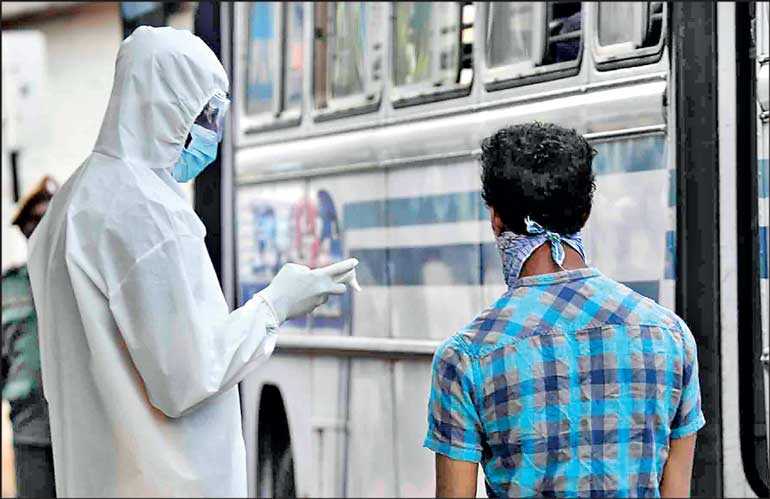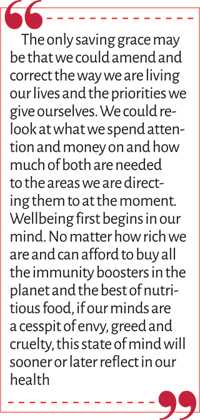Wednesday Feb 18, 2026
Wednesday Feb 18, 2026
Saturday, 24 October 2020 00:10 - - {{hitsCtrl.values.hits}}

By Suryamithra Vishwa
We do not come here forever. That is for sure. If we did we would have a fate as terribly similar to that of the human and the mouse accursed with immortality as per the creative imagination of French novelist Simone De Beivoir. Although such immortality is probably the dream of our politicians, every human being is fortunately or unfortunately, mortal.
As the Buddha discovered and thus attained wisdom and enlightenment, all life ends in decay. Death is unpreventable. Illness and decay is also unpreventable and the best of us, even the most robust, do succumb to the vagaries of our internal eco system. Like that of nature it is not always a verdant landscape; there are changes and there are turbulent seasons.
The philosophy of Buddhism should ideally help us to be a very wise people; dealing in a balanced way with life, death and the challenges in between. The philosophy of Buddhism should help us to be tolerant of the fact that nothing remains the same. This understanding should help us be compassionate to ourselves and others when we/they are afflicted by illness. Our impermanent bodies are never permanently well and able and we get ill, but we also recover from illnesses and are whole again. In the process we can learn something from this journey. Hopefully something of the nature of reality. If imbibed properly it will help us grow as humans and become ‘beings’ of understanding, empathy and compassion. Thereby we can truly be ‘human beings.’
 Yet, is that what is happening today in a mass scale?
Yet, is that what is happening today in a mass scale?
Earlier this year we saw mass hysteria and stigmatising COVID-19 patients and utter selfishness in the rich hoarding up food without a scant thought for others. A fortnight ago we saw the heroines of this country who suffer near slave labour to keep this economic going subject to humiliation and ridicule. All because they experienced impermanence; where their bodies gave way and they got sick and caught a virus rampaging the earth.
For those who do not know about the life of a garment factory worker, let them be reminded; these young women are not sustained by five-star comfort and assisted by fancy allowances (such as enjoyed by some tycoons who can bust Rs. 100,000 on one meal and blithely cover it up through office coffers under the euphemistic tag of ‘entertainment allowance’). They do not enjoy godlike status and are thought of as the saviours of the economy although these young women indeed are. They are saviours of a lopsided economy where exploitation parades in the tag of a cheaply paid overworked job. They live in crowded rooms and can barely afford a meal a day with the pittance they get. They do not have the money to go and buy expensive immunity boosting vitamins and whatnot and eat fresh fruit and vegetables and protein as many who can afford it do these days religiously. These women can barely scrape through a meal of dhal a day. They are overworked and overwhelmed and yes, in a time of viruses they may be the first set of casualties. And when they get sick, whether it’s COVID-19 or the common cold, we have a mental pandemic worse that corona if we treat these innocent women akin to criminals.
It is fine for us to reap the dollars that they earn for us by slaving from morning till evening at a sewing machine but not fine for us when their over exploited immunity gives way.
There were several detailed media accounts on how these women were treated after they were identified with the virus. It is not so much of a wild guess as to whether they will be treated this way if they were rich and/or powerful.
This pandemic should open our eyes
This pandemic should open our eyes to our attitudes and how these attitudes become everyday behaviour.
In a recent interview in this page with Dilmah Tea founder Merrill Fernando, he highlighted how this pandemic could be a chance for the world to wake up to the irresponsible manner in which life has been lived thus far in the realms of industry, business and commerce. He also explained what true money making and prosperity should mean in a truly holistic manner. (http://www.ft.lk/harmony_page/There-will-be-a-new-set-of-entrepreneurs-to-lead-the-way-Merrill-J-Fernando/10523-705932).
Indeed such words should resonate with us in these certain times. We have to retain our immunity of physical health not our emotional health.
In some previous articles especially in a series on education co-authored by Professor Rohana Ulluwishewa and this writer, we examined many points where students should be guided to see what is wrong with society so that they find the needed solution in whatever knowledge/art sphere that they follow. (http://www.ft.lk/harmony_page/Putting-spirituality-into-practice-Changing-Sri-Lanka-s-education-paradigm/10523-693804);
(http://www.ft.lk/harmony_page/Integrating-spirituality-into-education-Research-as-a-spiritual-practice/10523-697486).
Hence it is a dire need for us, especially in these unpredictable times, to build up a generation who will be trained not as non-feeling educated machines who are excellent at memorising and following orders, however detrimental those orders are to other beings but instead human beings who hone their skill and their empathy to represent through their intellect/skill those who are weak. Thereby we need to educate a new generation where our children will be quick to correct their parents if they identify something inhuman in either speech or action.
Many today wait for a time when COVID-19 will just saunter away and leave us in some idyllic bliss. Yet do we want to be half blinded the way we were, where we turned away from what was wrong in almost everything that surrounds us that we had trained ourselves to think as normal?
Over half of the world was daily suffering from the pandemic of hunger, of war, of corruption, of exploitation, of greed or all of them combined and our planet was being abused daily by our so called superior knowledge.
We had crafted modern money making to become a vice and not a thing that can be used to save the world. The job of a lawyer or a doctor has become not a route to save the oppressed but something of social prestige/stature and unlimited money making potential. To have a religion has become synonymous with oppressing another because the other’s belief is not the same and the world seems to have forgotten that the most supreme of faith is the faith of the heart; the faith of humanity. This humanity begins in how we treat this earth and all that lives in it.
Soon after the first phase of the pandemic we carried in this page three articles on the Kogi community, an indigenous ethnic group whose home is in the Sierra Nevada de Santa Marta mountains in northern Colombia, fast encroached by the concretisation based so called civilisation of today. We focused on the two warnings the Kogi had given the world; first in 1988 and then in 2012. They had warned of unknown diseases for which there would be no cures. They warned of increased hatred in the heart of man and increased wars.
(http://www.ft.lk/harmony_page/A-glimpse-into-the-message-of-the-Kogi-indigenous-tribe-protectors-of-the-Great-Mother-the-Earth/10523-700595); (http://www.ft.lk/harmony_page/Following-the-Kogi-footsteps-to-be-protectors-of-this-earth/10523-700891); http://www.ft.lk/harmony_page/The-world-as-we-have-made-it/10523-700596).
The full blame has been put on us, the humans who have considered ourselves so superior to mother earth and also superior to each other as seen by the global penchant for destruction of nature and humans. The Kogis had warned that if man continued with the warped pattern of living this brief life on earth that he would herald the end of the world as we knew it.
Their warnings come amidst a host of problems they face, including the encroached construction of buildings within territory of their sacred sites.
Wishful thinking
The crux of the matter is that while we are waiting for COVID-19 to go away we will have to remember that this wish may be merely wishful thinking and that we may have to live with this dark reality that may get even darker (or not).
The only saving grace may be that we could amend and correct the way we are living our lives and the priorities we give ourselves. We could re-look at what we spend attention and money on and how much of both are needed to the areas we are directing them to at the moment. Wellbeing first begins in our mind. No matter how rich we are and can afford to buy all the immunity boosters in the planet and the best of nutritious food, if our minds are a cesspit of envy, greed and cruelty, this state of mind will sooner or later reflect in our health.
Hence, whether there is a lockdown or not, what we should now give attention to is how much we have progressed as humans from March to now; i.e. how much we have learnt about ourselves, about our weaknesses and our strengths.
It is apt that this writer ends with something personal. In the March lockdown when there was a scarcity of cooking items, I was hanging onto a coconut oil bottle. A woman who lives closeby who works as a domestic assistant in a nearby house in Kandy asked after my wellbeing and I said that I was managing and that I had alongside few dry rations a bottle of coconut oil, a great boom for someone not greatly skilled with cooking. The very next opportunity curfew was lifted she brought a large bottle of coconut oil bottle – the kind of which is found in the super markets – having got it from a richer relative and doggedly refused the money.
When I asked her how she would manage she promptly responded that they still have some of the ‘usual crude coconut oil from the handiya kade’. This is when the partial lockdown was continuing in Kandy in fits and starts. If the roles were reversed I am not sure I would have been as magnanimous as this woman at that time. I told her this and thanked her for teaching me some selflessness.
Hence whatever we have to face the next few days let us rise above our weaker selves, in terms of more than what is manifest as physical health. Let us strive for improved empathy, love and compassion related health.
We can sit in one location and not venture out and yet have the whole of the universe within our hearts and be rich in love. Likewise we can travel the whole of the universe and can do so with scant humanism within us and be paupers of love.
Like what is expected of our minds, may we be a master of COVID-19, not its slave.